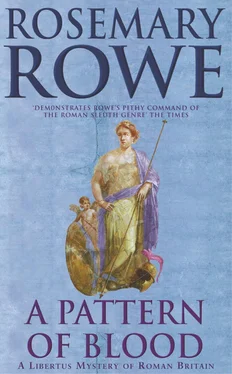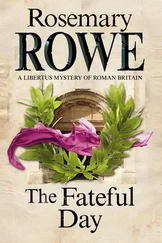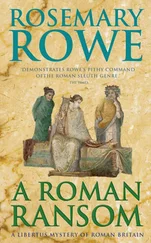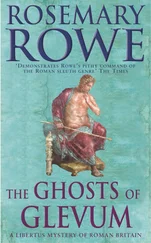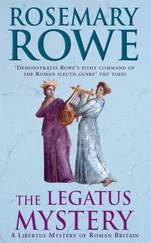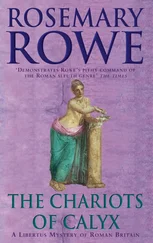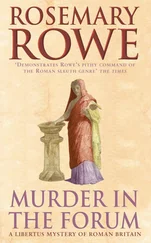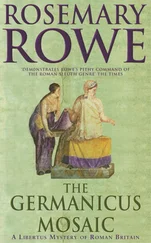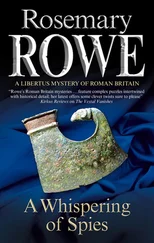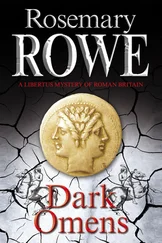Rosemary Rowe - A Pattern of Blood
Здесь есть возможность читать онлайн «Rosemary Rowe - A Pattern of Blood» весь текст электронной книги совершенно бесплатно (целиком полную версию без сокращений). В некоторых случаях можно слушать аудио, скачать через торрент в формате fb2 и присутствует краткое содержание. Год выпуска: 2000, ISBN: 2000, Издательство: Headline, Жанр: Исторический детектив, на английском языке. Описание произведения, (предисловие) а так же отзывы посетителей доступны на портале библиотеки ЛибКат.
- Название:A Pattern of Blood
- Автор:
- Издательство:Headline
- Жанр:
- Год:2000
- ISBN:9781472205063
- Рейтинг книги:4 / 5. Голосов: 1
-
Избранное:Добавить в избранное
- Отзывы:
-
Ваша оценка:
- 80
- 1
- 2
- 3
- 4
- 5
A Pattern of Blood: краткое содержание, описание и аннотация
Предлагаем к чтению аннотацию, описание, краткое содержание или предисловие (зависит от того, что написал сам автор книги «A Pattern of Blood»). Если вы не нашли необходимую информацию о книге — напишите в комментариях, мы постараемся отыскать её.
A Pattern of Blood — читать онлайн бесплатно полную книгу (весь текст) целиком
Ниже представлен текст книги, разбитый по страницам. Система сохранения места последней прочитанной страницы, позволяет с удобством читать онлайн бесплатно книгу «A Pattern of Blood», без необходимости каждый раз заново искать на чём Вы остановились. Поставьте закладку, и сможете в любой момент перейти на страницу, на которой закончили чтение.
Интервал:
Закладка:
‘I confess, citizen, that I find the circumstances just a little suspicious. Of course, if you are able to recall where you went when you left — whether you came straight to us, for example — that may assist you. Could anyone have seen you leave your father’s room, for instance?’
He seemed to consider this, and hesitated, but he said nothing.
‘Well,’ I said, ‘Marcus is waiting for you. Tell him your story, citizen, and try to sharpen your memory before he finds ways of doing it for you.’
Maximilian gave me a scowl as though I were the personal cause of all his miseries, and slammed past me into the study. Shortly afterwards I heard the murmur of voices.
In fact, simply by coming out here, I had answered one of my own questions. From here, between the screen of trees, I could see the front gate and most of the colonnaded walk: there was a clear view into the ante-room opposite, as I had just demonstrated, and Mutuus had been standing here earlier when he witnessed me eavesdropping by the hedge. Anyone leaving the study, or simply standing behind the open door, could take in most of the garden at a glance, apart from the deliberately secluded arbours. No other spot in the house commanded such a wide vista. Perhaps Quintus had designed it like that, on purpose, so that he could survey the fountains and greenery from the comfort of his study.
I walked thoughtfully down the veranda of the study wing, and past the doorway which led into the atrium and so to the main rooms of the house. Through it I caught sight of pairs of slaves, still hurrying to and fro with platters and wine, and the sound of a lute and a plaintive song wafted from the triclinium. Lupus and Flavius, although unwilling guests, were evidently still enjoying the ‘light meal’ which Sollers had organised, presumably in Julia’s company. I shook myself impatiently. I had come to Corinium, at least in part, in the hope of continuing my search for Gwellia. Why should it matter to me where Julia was?
I walked through the atrium and out into the rear courtyard again.
It, too, was alive with industry. There were slaves everywhere: some scurrying past with serving dishes and lamps for the living, others clearly already preparing the memorial feast of the dead. Kitchen slaves were cutting sprigs of rosemary from the border, others were fetching water in wooden buckets from the fountain, or dried fruit and barley flour in brimming bowls from the stores. A brawny cook appeared, a brace of fat hens fluttering upside down in either hand, and as I watched, a party of slaves returned from the market stalls bearing between them a great side of bleeding meat, long strings of river fish and a dozen dead thrushes on a pole. The ghost of Quintus would not return vengeful from the afterworld because it had not been fed.
The rear court was smaller than the front, and was divided into quarters by walkways radiating from the pool. Each quarter was planted with its own selection of sweet-scented plants and herbs for the kitchen, with a fruit tree at its centre, and each had a small grotto in the corner nearest the pool, presumably with a seat and a statue of one of the gods set on a plinth. Anyone crossing the courtyard, or using the covered path which skirted it, was clearly visible from all sides, and the slaves collecting herbs were constantly in view, unless they were momentarily screened by the statues and the trees, or simply by bending down among the plants.
One figure, however, caught my eye. It was a female slave, with a cape drawn over her head and a jug in her hand, and her manner, as she came out of the kitchens, could only be described as ‘skulking’. She looked nervously to left and right, and then scuttled along one of the paths towards the pool. When she looked up and saw me, she dropped the jug and disappeared into a grotto. I was baffled. It was my presence, clearly, which she wanted to avoid — she had walked openly past the other servants.
I waited for a moment, but she did not reappear. I thought of marching in and confronting her, but the girl had seemed so embarrassed that I decided to finish my stroll around the perimeter walk, and explore the grotto later.
Like the rest of the house, the courtyard was built to impress, with fine mural patterns on the inner walls and a paved walkway linking the rooms under the sloping shelter of a roof. All the guest apartments, including my own, were on this side of the courtyard, and were self-contained. So were the kitchens, slave rooms, store rooms and latrines in the separate block at the back. Maximilian had once had a bedroom in the main block, in a small room near his father’s reception suite, reached by a second passage to the rear court. But Quintus, Julia and Sollers had their apartments in the wing opposite me.
I wondered if any of the apartments were interconnecting. Usually rooms in courtyard houses are self-contained, with a blind wall to the outside world and a single doorway opening onto the inner walkway. I stopped a passing slave who was rolling a cask of fattened snails towards the kitchen, and he confirmed my guess. The rooms in the farther block were arranged as two suites. Sollers had a sleeping room with a small adjacent study, and there was an interconnecting door between the apartments of Quintus and his wife. For moments when he hoped to make a son, presumably. Marcus would not find that thought pleasing.
I sent the slave about his business and continued my stroll. I kept glancing towards the central grotto, but wherever I stood, it was largely screened from view. The caped figure was invisible. When I turned my back, however, to glance into the slaves’ waiting room, there was a scuttling behind me, and I turned around just in time to see her slip out, retrieve her jug and scurry as fast as possible in the direction of the main block. She disappeared into the far passage and was gone.
The light was fading now, and I was anxious to get back to Marcus before he finished his enquiries without me. Since he had mentally identified Lupus as the killer, I knew that his questions to everyone else were likely to be perfunctory.
All the same, I wanted to examine the grotto. The girl had hidden there. Could a killer have done the same — perhaps even as Marcus and I were hurrying to the murder scene? I walked across and examined the bowers carefully, but there was nothing particular to see. No helpful fragments of cloth caught on the stone seats, no wisps of hair trailing on the branches, no footprints with distinctive hobnail patterns imprinted in the earth. I looked at the statues. They were half as high as a man, and elegantly carved. A predictable foursome: Jupiter, Mercury, Mars and Minerva. Quintus, it seemed, had a particular attachment to Minerva. It was her statue which I had also noted in the front courtyard, though this was a far superior sculpture.
I moved a little closer. Certainly, someone in the household favoured the goddess. There had been recent oblations offered at the shrine. Small fragments of bread and morsels of honey cake had been scattered on the plinth, where the birds were accepting them gratefully, if Minerva had not. Someone had offered a libation too; there was a dark dampness in the fresh earth channel in front of the statue, as if someone had poured out a liberal cupful of red wine. I bent and touched my fingers to the earth.
They came away sticky, and I gazed at them in dismay. A swift sniff confirmed my suspicions. The liquid had been red all right, but it was not wine. Someone had offered Minerva a libation of fresh blood.
The caped girl had not put it there. She had dropped her jug before she went into the grotto, and in any case the libation was too old for that. Of course there was another possible explanation. Animal sacrifice is common at Roman festivals, the blood poured out by the officiant and the flesh eaten afterwards. In wealthy households like this, the monthly festivals were usually marked by a family sacrifice. Yet it was far from the first or last day of the month, and the earth was still moist. Even allowing for the general dampness of the air and soil, this blood had been spilled here not many hours ago. Since we had been at the house, I guessed. But there had been no mention of a memorial sacrifice, no family attendance at the shrine, and there had been none of the squawking and squealing which usually accompany the ritual slaughter of chickens, lambs or pigs.
Читать дальшеИнтервал:
Закладка:
Похожие книги на «A Pattern of Blood»
Представляем Вашему вниманию похожие книги на «A Pattern of Blood» списком для выбора. Мы отобрали схожую по названию и смыслу литературу в надежде предоставить читателям больше вариантов отыскать новые, интересные, ещё непрочитанные произведения.
Обсуждение, отзывы о книге «A Pattern of Blood» и просто собственные мнения читателей. Оставьте ваши комментарии, напишите, что Вы думаете о произведении, его смысле или главных героях. Укажите что конкретно понравилось, а что нет, и почему Вы так считаете.
